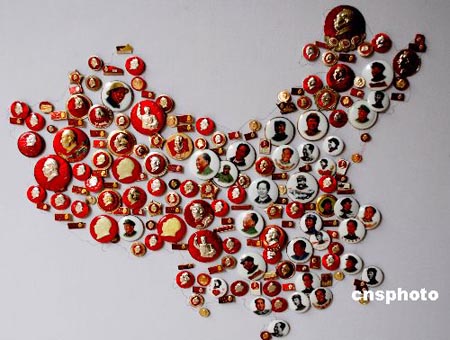(Ecns.cn)--The year 2013 will mark the 120th birthday of Chairman Mao, the architect and founding father of the new China. To herald the occasion, the publishing industry is compiling stories about various collectibles related to Mao, as well as other "red collections" in different areas of the country.
Wang Liansheng, a professional collector who lives in Shanxi Province, has been assigned chief editor of the project in the area. "For people like me, red collections are not used to make profit, but are a way to show our love for the country and the Party."
Every day Wang enters his room of "red collections," where he often lights and offers a cigarette to a statue of Chairman Mao. Like many other such collectors, there is a story behind why he's so keen to collect souvenirs about the "Great Helmsman."
Anyone who has been through the Cultural Revolution (from 1966 to 1976) has a connection with Chairman Mao, be it negative or positive. In 1966 Wang received his first Chairman Mao badge when he was still a junior high school student. Wang adored the chairman and was very excited about the badge, so he began to collect others.
Every Sunday, young Wang packed his school bag and either headed to the train station in Taiyuan, the capital of Shanxi Province, or to various markets where he could find or exchange badges with others. Sometimes he starved himself to save money, or spent hours standing in line just to buy one.
However, during the Cultural Revolution Wang nearly lost his collection due to political struggles. "Someone came to my family and asked my mother to hand over all the badges and statues," recalled Wang, "but my mother lied to them, which finally saved my collection."
Wang holds a very pious attitude towards the badges and statues. "Some people wanted to use steamed buns to exchange with me when I was starving, but the badges are invaluable."
Most of Wang's collection required a great deal of effort, but there were also items that came without much difficulty. Wang remembered two boxes of badges that he got from a soldier in Beijing, some of which were boutique goods.
Since 1966 Wang has collected over 30,000 badges, 300 statues and displays, and at least 8,000 little books with quotations from Mao.
December 26, 1993 marked the 100th birthday of Chairman Mao, spurring a new round of souvenirs in the country. Although many people collected badges and statues purely for auction, the occasion gave Wang new thoughts about his collection.
"We collect these things in order to save them and educate following generations about our history," he said. For Wang, the badges are more than the leftovers of the Cultural Revolution; they are about the Party and the country.
Wang has done considerable research and read many books about the Communist Party, finding stories behind every badge in his collection.
He has divided over 30,000 badges into various categories according to different period and background story. He even thought of opening a museum in his house to display the collections and introduce their history.
Because of his knowledge and passion for collecting badges, Wang was assigned the task of compiling the book, which has given him a new chance to continue his research and deliver a speech.
A country with a prosperous economy is not enough; abundant culture is what makes a country truly strong, according to Wang. The family museum will help him continue to spread knowledge to younger generations.
"I want to pass down red culture and make the family museum a base for red education," said Wang.
"Collecting is not a simple thing to do, especially red collecting," he added. "A good collector needs to have background knowledge and read many books on the badges. If a collector does not know the meanings and the stories, the value of the collections will be meaningless."


















